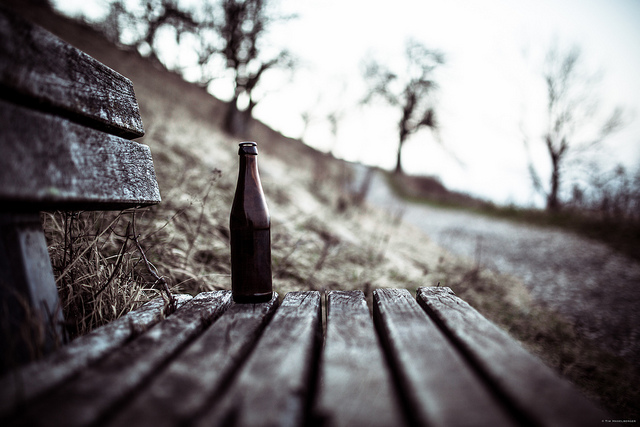Eleditor’s note: Elephant is a diverse community of sixteen million readers and hundreds of writers (you can write too!). We are reader-created. Many blogs here are experience, opinion, and not fact or The One Right Point of View. We welcome all points of view, especially when offered with more sources and less invective, more frankness and less PR. Dislike this Op-Ed or opinion? Share your own take here.
The third Sunday in June sits like a time bomb.
For many children of alcoholics, holidays bring up all kinds of memories based on dread, anxiety, fear, sadness.
And for the adult child of an alcoholic, those feelings remain.
Which dad would show up? The one who played softball with you, taught you to adore old movies, taught you how to catch fish and change your tires?
Or the one who was a mean drunk. The one who caused havoc during the holidays and all through the year when he was on a bender. The one who used words and hands as weapons—words that a little kid might not really know the meaning of, but can pretty easily grasp that those are words you don’t repeat around grandma…or anyone else.
For the most part, even when the family tries to keep the fiction of “normal, everyday life,” it’s a sad fact that if you’re in a small town or close-knit neighborhood, everyone knows.
They’re polite about it, but they know all the same.
It’s very easy to get angry at the other parent for not sticking up for you or themselves, for not getting out. But what’s difficult to understand is that the other parent is most likely just as scared as the kids are.
Sometimes, when sobriety sticks, the alcoholic makes amends, or tries to. The hard part is that even though it’s “part of the process” for the alcoholic to apologize or try to “be a better person,” when a person is on the receiving end of such an action, it can feel like there’s still too much anger bottled up.
It could be that the person harmed is still grieving a childhood lost, while the recovering alcoholic is (in the opinion of the recipient of the apology) “blithely on Step 9” and trying hard to admit a wrong.
But sometimes, the recipient isn’t there yet. And they may not be ready to hear what the alcoholic has to say.
Even if siblings and other family members have accepted the apologies, there may be a child or family member who’s just not done processing the life they lived and how much it’s now changed with the “new, improved, sober” family member.
Many adult children of alcoholics share personality traits. They’re over-achievers, control-freaks, usually have a pattern of avoiding conflict, and can sometimes be attracted to alcoholics in the misguided attempt to “save” them. But they have some shortcomings. They learn tricks to control their environment, and ways to adapt that become unconscious—kind of like the Invisibility Cloak that Harry Potter wore, a normal part of their personality’s “wardrobe,” if you will.
Sometimes, they have lots of issues.
Like, when a spouse has a glass or two of wine, they can get really, really twitchy. Even if the spouse has never ever been intoxicated. They can be pretty intolerant: don’t look for sympathy for your hangover from the child of an alcoholic. You won’t find it.
The “fooling your mind” tricks may include how to ride in the back seat when the driver is drunk and weaving in and out of traffic at high speeds. The trick is to always look forward—never look directly out your window because it’s too scary.
Being able to come into a room without anyone noticing is something that’s learned early. Another trick of the child of an alcoholic: never, ever draw attention to oneself, because that only invites trouble.
Leaving a room without anyone noticing is also a good skill.
It’s not uncommon, after an alcoholic spouse has died, for the remaining spouse to sanctify the deceased. They go on and on about how beloved the alcoholic was. What a good parent, what an exemplary member of the church, a hard-worker, good provider. And the child of the alcoholic will shake his or her head, because that’s not the house they grew up in.
This leads to long-held tensions and sometimes leads to irreversible rifts in the family.
As Father’s Day 2015 comes around, things can be difficult for the adult child of an alcoholic. There’s that whole forgiveness thing. In a journey toward mindfulness and acceptance, reaching one’s hand out to either literally or figuratively grasp for forgiveness is an ongoing process. Some of us will reach that hand out and hold onto that forgiveness for all it’s worth.
Some of us can’t. Not yet.
So if you know a child of an alcoholic, please understand that it’s not always cake, ice-cream, presents and a barbecue on this day. Sometimes we’re mourning—not only what we’ve lost, but what we’ve never had.
References:
Characteristics and Personalities of Adults Who Grew Up with Alcoholism in the Home. Searidge Foundation Website.
Author: Pat Perrier
Editor: Renée Picard
Image: tim-rt-photography at Flickr


 Share on bsky
Share on bsky





Read 2 comments and reply